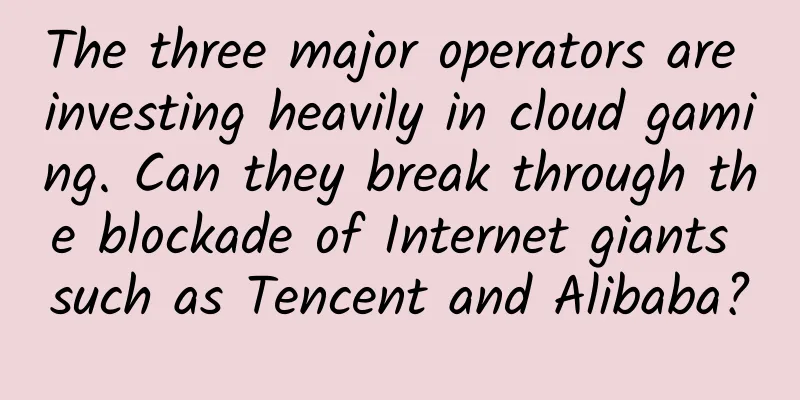The three major operators are investing heavily in cloud gaming. Can they break through the blockade of Internet giants such as Tencent and Alibaba?

|
With the massive construction of 5G networks, because the application level has failed to keep up in time, external voices have gradually begun to become noisy. On one side, there is the support from the media and technology companies, while on the other side, there are the doubts from users. 5G networks are the foundation for realizing the Internet of Things and autonomous driving, but the "5G is useless" theory is becoming a common saying among some netizens. The argument is - where is the "killer application" of 5G? So, for operators who have spent countless construction costs, what kind of applications should they use at the C-end user level to make users feel enough? The three major domestic operators have given their answer - cloud gaming. Which two Gs does 5G have more than 3G? Last year, a video by UP host "Hello Teacher, My Name is He Tongxue" about experiencing 5G network went viral on the Internet. In the video, He Tongxue expressed the public's confusion about the application scenarios of 4G speed on the eve of the popularization of 4G in 2013, and attributed the rise of mobile Internet to 4G, putting forward the view that "we cannot look at 5G with the current technological perspective." With the help of various big Vs, He He attracted 2 million fans and his video was played over 15 million times, which caused heated discussions on the Internet. But controversy soon followed. In He He's video, he mentioned that short videos, taxi-hailing, mobile payments and other applications that have emerged due to 4G are actually completely feasible with 3G bandwidth. Some people even dug up a promotional video of China Mobile in the 3G era in 2007. The video included application scenarios of smart home, telemedicine, and even autonomous driving, which is no different from the current 5G promotion direction. One can't help but sigh at the lack of imagination. However, fast forward to 2020, netizens' questioning of 5G applications also reflects that current users do not have a strong demand for high bandwidth. In fact, 3G bandwidth is sufficient for current application scenarios such as games and videos. Foreign operators have long been aware of this problem. As highway builders, they are not satisfied with just collecting highway tolls, but also set up their own logistics companies, which can improve road utilization and take advantage of their own cost advantages to avoid pipelines. When network technology was transitioning to the 4G era, Verizon spent $4.4 billion to acquire America Online (AOL), and AT&T spent $49 billion and $85.4 billion to acquire satellite TV company DirectTV and television media giant Time Warner, respectively, officially laying out its content industry. The situation of domestic telecommunications companies is not so optimistic. Although China Mobile, China Unicom and China Telecom also have Migu Video, Wo Video and Tianyi Video, they still lost in the competition with Internet giants such as Tencent and Alibaba, and became others in the content market. Perhaps due to bandwidth cost considerations, the bit rate of content provided by Tencent and Alibaba's iQiyi, Youku and Tencent Video is always extremely compressed. Even the so-called 4K Blu-ray video bit rate is only 5Mbps, which is far from the Blu-ray standard of 30Mbps. Not to mention 5G networks, even 3G bandwidth is more than enough. Is 5G a myth or a joke? Compared with 5G's ambiguous business model, what makes operators even more sad is that the cost of building and maintaining 5G networks is too high. Not long ago, a news report about an operator shutting down 5G base stations in order to save power became a joke online. Of course, this is not a joke. China Unicom Luoyang Branch issued an announcement, saying that in order to solve the conflict between high operating costs caused by high energy consumption of 5G base stations and low user income, it adopts the method of putting the 5G base station radio frequency unit (AAU) into deep sleep in time periods to achieve the purpose of intelligent control of energy consumption. Simply put, 5G electricity is too expensive, too few people use it, and power is turned off at night to save electricity. This is because, at present, the average power consumption of a 5G outdoor base station is about 3.8KW, which is more than three times that of a 4G base station. According to estimates, 5G base stations have a smaller coverage area than 4G base stations and require a deployment density that is 3-4 times higher. Therefore, the overall energy consumption of the 5G network will be more than 9 times that of the 4G network. The electricity bill for a 5G network with the same coverage scale as 4G will likely exceed 20 billion yuan, which is equivalent to China Mobile's full-year profit in 2019. The cost of 5G construction is even higher. Experts predict that China will need to invest 1.2 trillion yuan in 5G construction, which is equivalent to the total profit of the three major operators in 8 years. As reflected in the financial reports, the profit growth rate of the three major operators in the first quarter of 2020 has dropped sharply. China Mobile's revenue decreased by 2% year-on-year, net profit decreased by 0.8% year-on-year, and sales product revenue decreased by 34.9% year-on-year; China Telecom's revenue increased by 0.7% year-on-year, net profit decreased by 2.2% year-on-year, and network operation and support costs increased by 9% year-on-year; China Unicom's revenue increased by 0.9% year-on-year, and net profit decreased by 13.8% year-on-year. Yang Jie, chairman of China Mobile, publicly complained: "The new business model of 5G is not very clear. The investment is huge, but there is a lack of motivation for operators to build better." You hit the nail on the head. The answer to the operators' problem is actually very simple. As long as users upgrade to 5G packages and use real money to spread the construction and maintenance costs, the problem will naturally be solved. But why should users upgrade? In the 5G era, giants are betting on cloud gaming To put it simply, cloud gaming means that the computing part and storage unit of a gaming computer have been moved to the cloud. The user's mobile phone, smart TV, and PC are only used as input and output devices. The user sends the operating instructions to the cloud gaming server. The server puts the instructions into the virtual machine for computing and rendering, and then transmits the picture to the user's screen for decompression and restoration. It is not difficult to find that under cloud gaming, user device configuration and performance are no longer important. Even low-configuration computers, smart phones, and even smart TVs can run all large-scale games smoothly as long as the network conditions are ideal. There are almost no requirements for equipment, only requirements for network bandwidth, which perfectly meets the needs of 5G operators. It can not only stimulate users' demand for 5G, but also is an application with high bandwidth requirements. Therefore, China Mobile, China Unicom and China Telecom almost simultaneously launched their layout in the cloud gaming market, launching Migu Quick Game, Wo Games and Tianyi Cloud Games respectively. Of course, it is not only the three major operators that see the business opportunities of cloud gaming in the 5G era. Game manufacturers, game publishers, and cloud service providers have all deployed cloud gaming. Currently, cloud gaming platforms are flourishing everywhere. NetEase Cloud Gaming, Ge Lai Cloud Gaming, Yunqiu Cloud Gaming, Mushroom Cloud Gaming, Caiji Game and other platforms are all excellent cloud gaming platforms on the market. However, in general, cloud gaming is an asset-intensive industry. Cloud gaming platforms must deploy a large number of server rooms across the country, and every player must be within a 300-kilometer radius of a server room to ensure a low-latency gaming experience. This is also why there is currently no cross-border cloud gaming platform. PlayStation Now is only for Japanese players, Geforce Now and Project xCloud are mainly for American players. If Google Stadia wants to expand globally, it will need to deploy 7,500 nodes around the world in the future, which shows how difficult it is. On the other hand, in the cloud gaming industry, geography will become a natural barrier that will keep foreign platforms out, and domestic companies will have greater room for free development. Among the current domestic cloud gaming platforms, the three major operator platforms that were deployed earlier are undoubtedly more advantageous. Not only are their node and bandwidth costs extremely competitive, but the IPTV platform also has excellent network conditions that are incomparable to ordinary broadband because it is supported by IP private networks. In addition, compared with other competitors in the cloud gaming industry, the operators' cloud gaming business and 5G network business complement each other and have a mutually reinforcing effect. The operators themselves are more motivated to make capital investments. Cloud gaming is undoubtedly the trend of the 5G era that operators must seize at all costs. Cloud gaming becomes a breakthrough, can operators break through? Although we are very optimistic about the future development prospects of cloud gaming, especially large-screen cloud gaming in the living room on smart TV platforms, we still have to pour cold water on operator cloud gaming. The first thing to be affected is the chaotic copyright situation in the current cloud gaming market. Foreign cloud gaming platforms are still relatively restrained. Google Stadia allows members to play some games for free, while new games can be bought out. Sony PlayStaion Now and Microsoft xCloud have their own game store attributes, providing 650 and 3,500 games respectively. GeForce Now does not have its own game store, but provides a cloud computer-like method for users to play games owned by their platform accounts. Although the three major operators all claim that they own the copyrights to all games on their cloud gaming platforms, in fact things are obviously not that simple. A large number of game copyrights of the three major operators are obtained through copyright chain authorization. Several major cloud game platforms obviously share several copyright chains, and the overlap rate of console game lineups is extremely high. However, the operators themselves do not care whether such a copyright chain can be legally traced back to the original copyright holder of the game. For specific situations, those who are interested can learn about the ups and downs of the copyright licensing history of "Tetris". On August 28, X.D. Network, the exclusive mobile distributor of Human: Fall Flat in mainland China, issued a statement, implying that Migu Quick Game, a subsidiary of China Mobile, provided Human: Fall Flat to players in the form of cloud gaming without authorization for profit, infringing the interests of the copyright owner. On the other hand, due to policy reasons, operators' cloud gaming platforms can only use private cloud platforms. However, the industry has basically reached a consensus that 80% of the computing power of cloud gaming will be deployed on public cloud platforms in the future. Compared with private clouds, public clouds have many advantages in the field of cloud gaming. First, shared cloud computing power can be adjusted in real time according to demand, and initial investment is more flexible; second, the diverse types of public cloud customers can effectively smooth out the peaks and troughs of cloud gaming, improve server resource utilization, and reduce unit concurrency costs; finally, although the single-channel concurrency cost of the public cloud is temporarily higher than the self-built cost, with the optimization of technology, the elimination of hardware price discrimination and the overall decline in hardware prices, the public cloud will eventually unify the IaaS layer. In short, in today's broadband and 5G network environments, cloud gaming is no longer just a concept, and has begun to provide players with a gaming experience that is no less enjoyable than local gaming. This shows that its commercial reality has matured. What the industry needs to do next is to continue to optimize related technologies, reduce construction and operating costs, and continuously improve the cloud gaming experience. After that, it is the implementation of game copyrights and the exploration of commercial operation models. Today, China Mobile, China Unicom, and China Telecom still have first-mover advantages in the field of cloud gaming, but Tencent START, Alibaba Cloud, and NetEase Cloud are also ready to go. Let us wait and see whether these operators can use cloud gaming as a breakthrough in their content field and break out of the encirclement of giants. As a winner of Toutiao's Qingyun Plan and Baijiahao's Bai+ Plan, the 2019 Baidu Digital Author of the Year, the Baijiahao's Most Popular Author in the Technology Field, the 2019 Sogou Technology and Culture Author, and the 2021 Baijiahao Quarterly Influential Creator, he has won many awards, including the 2013 Sohu Best Industry Media Person, the 2015 China New Media Entrepreneurship Competition Beijing Third Place, the 2015 Guangmang Experience Award, the 2015 China New Media Entrepreneurship Competition Finals Third Place, and the 2018 Baidu Dynamic Annual Powerful Celebrity. |
>>: University of Mainz, Germany: Study finds link between soil pollution and heart disease
Recommend
5 ways to promote your app
Now when you open the app store, whether it is fr...
Is it necessary to refer to keywords to guide bidding in bidding promotion?
Now the Baidu backend has its own keyword bidding...
Zhang Qi's "Traffic Digging and Exploring Omni-channel Growth" has 3 major sections to decipher traffic strategies and easily get the code for network-wide growth
Training course video lecture content introductio...
Is your iPhone frozen and shut down during the cold snap? Should Apple be blamed for this?
Do you know the loneliness you feel when your cel...
The fourth course of Qihangge video account
Course Catalog Dagang: 1. Video account recommend...
Is it illegal not to have a Qingming Festival holiday in 2022? Will the school be reopened during the Qingming Festival? Attached the latest news
As the Qingming Festival holiday approaches, the w...
YaYaYa! The 280th Danxia flyer turned out to be this one!
Danxia bird season is here, and the Guangdong Dan...
The No. 1 game in PC history is born! A monster-level game that beats GTA
If someone asks you, what is the best PC game in ...
Tesla's sales in California fall: old cars are not selling well on the eve of launching new cars
According to foreign media reports, according to ...
Cool effect, Volvo submits patent application for new head-up display
According to foreign media reports, Volvo recentl...
The tiny rockhopper penguin is the brightest rock star
Rockhopper penguins are small, with a body length...
Can we follow the trend of using AI to fill in college applications?
Free volunteer application software, proven to be...
Apple reportedly starts production of 12-inch MacBook Air next year
According to Digitimes, a Taiwanese technology me...
Flip phones are still being released in 2022? Why is Japan so popular in the manufacturing industry?
Recently, Japanese telecommunications company KDD...









